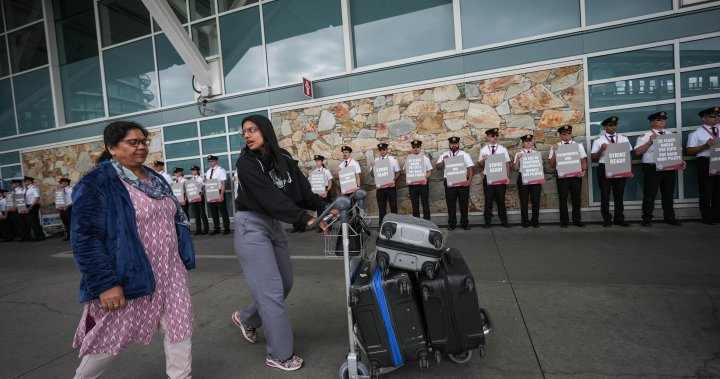With a potential strike by Air Canada’s pilots or a lockout by the company inching closer, travellers may be wondering what rights they have and what they can do if their flight gets cancelled.
The airline said Monday that plans were already being made to start suspending operations ahead of the potential work stoppage, with cancellations starting as early as Friday.
A settlement has to be reached by Sunday, otherwise, the airline or the Air Line Pilots Association (ALPA), which represents 5,200 Air Canada pilots, could issue a 72-hour lockout or strike notice.
The 72-hour shutdown or strike notice period could begin any time after midnight on Sunday, with operations expected to come to a complete halt by Sept. 18.
But with cancellations possible as soon as Friday, air travel experts say there are things travellers can do to mitigate the impact.
Should I rebook now or wait?
Travel expert Barry Choi told Global News that in the case of Air Canada, travellers should consider taking a “wait-and-see” approach — unless in a rush.
“If your flight is cancelled, quite often Air Canada automatically rebooks you,” he notes. “If your flight is still a few days away, maybe wait a few hours and just see what happens or contact your travel agent because they do represent Air Canada to a certain extent; they will be able to give you the most up-to-date information.”
Customers who choose to keep their flight but then have it cancelled due to a work stoppage will be notified within 48 hours of their planned departure and rebooked with the “best available options,” according to Air Canada’s website.

If the flight is cancelled outright by the airline, passengers will be eligible for a full refund regardless of fare type and no cancellation fees will apply. The refund, under Canada’s Air Passenger Protection Regulations (APPR), must be provided within 30 days of flight cancellation.
“There’s a very, very different scenario between you cancelling your ticket and an airline cancelling your ticket,” Kristine D’Arbelles, senior director of public affairs for CAA National, cautioned. “If they cancel your ticket, you have a right to a refund…. If you cancel a non-refundable ticket, well you’ve just cancelled a non-refundable ticket so you’re not going to get your money back.”

Get daily National news
Get the day’s top news, political, economic, and current affairs headlines, delivered to your inbox once a day.
There are other options due to a “goodwill” policy Air Canada has put in place due to the labour negotiations.
Those who booked a flight with Air Canada no later than Sept. 9 for travel between Sept. 15 and Sept. 23 can change the flight for free to another date either before Sept. 14 or between Sept. 24 and Nov. 30.
Will the airline pay for food or give compensation?
While the airline has procedures in place for refunds and rebooking, those looking for anything more than that may be out of luck.
Air Canada won’t be paying for food or hotels, nor is further compensation owed as a strike is deemed out of the airline’s control and thus does not fall under the APPR.

Martin Firestone, president of Travel Secure, a travel insurance brokerage, told Global News travellers who have already headed abroad or to another city are facing the bigger risk as they may be left having to find a new flight, book a pricey hotel for an unexpected stay or face other issues.
“It will be a nightmare…. The airline portion of this is just the minute amount of the cost that many people are going to be facing,” he said, adding if Air Canada goes on strike, that could lead to thousands of people’s flights being cancelled, meaning many people trying to book on other airlines.
What about travel insurance?
Experts say travel insurance is good to have, but with the potential work stoppage known, many brokers have advised if you book insurance now, they will not cover travellers if the strike occurs.
For those who have already bought insurance before the restriction was put in place, D’Arbelles says to make sure to check your insurance policy.
“I know the small print and the fine print and those long, long contracts with travel insurance are super, super boring,” she said. “But this is a reason why you want to just quickly look at it and make sure that you are going to be covered in certain scenarios.”
— with files from The Canadian Press
© 2024 Global News, a division of Corus Entertainment Inc.




